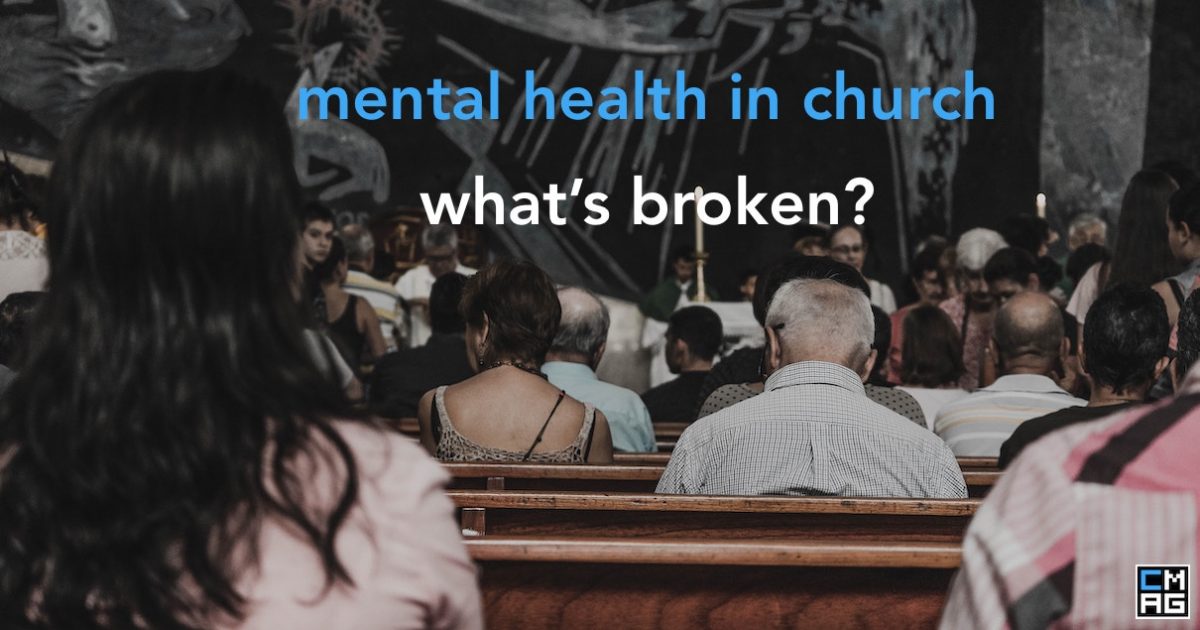Because mental health and the church are something I’m passionate about, Blessing challenged me to write about it. The conversation of mental health is not new to me. It’s been my job for the past six years–I’ve worked as a clinical counselor in two different community mental health centers, one in Colorado and now in Ohio. I’ve pushed my voice into the conversation of mental health as it applies to faith with ChurchAndMentalHealth.com as I try to be a resource to churches and their members.
What Is Broken?
Today we’ll talk about what is broken. Trying to fix issues without knowing their cause can perpetuate them. We need to shine a light on the conversation of mental health in our faith, to not only find out what is wrong, but what church leaders and Christians, in general, are doing that make the issues worse.
What is broken about mental illness within the Church? This certainly is not an exhaustive list, each culture within a nation is different. And different church size will have different issues.
- Stigma of mental health. We make it seem like mental illness is not a thing. Further, we portray it as a sin. Christians say it’s because we don’t try hard enough to get over it. We care too much and need to let it go. But these are all lies. Mental illness is because of the Fall, but not a sin in-and-of-itself. There is biological factors, grieving, and psychological issues that are not choices of having mental health issues and we must be aware of our words.
- Worship is geared to people without mental illness and developmental disabilities. Imagine you have a significant history of trauma from sexual abuse. You go to a church that has lots of lights, a bit dark, and lots of people. Or you are encouraged to sit at the front of the church, shake everyone’s hands, and stay after church to talk.
This person may have a panic attack. And, in an environment that should’ve connected him / her to God, one ends up disconnected.
- We use terrible language. Words are important, that’s why we have so many faith-based words within the church like communion, sacred faith, backsliding, and born again. Our words can be powerful, so when pastors from the pulpit use a phrase like “that’s crazy” or “you need to not be so depressed,” it can hurt. You might want to use these guidelines on how churches can use words better in their sermons.
- We never preach about the issues. Lifeway Research did a study five years ago with pastors and their congregation on the topic of mental illness. Further research has been done by Lifeway Research on how Christians see suicide discussed with churches. With both reports, the Church not doing even close to enough talking about it. Even scarier, pastors think they are talking about it some and congregations are feeling completely unsupported.
- We need to put our money and energy where our mouth (and Scripture) is. Scripture says to help those who are lowly, widowed and hurting. We set up once a year to feed the homeless and feel good about ourselves or give care packages to active duty military servicemen over Christmas, but we could do so much more. My church has recently put a mental health team with a church budget line item.
We’ve also created a Community Center with a place for inner-city kids to come to study and their parents to do laundry after school. A crisis response team is also in place in case someone has a psychotic or manic break during service as well as if someone is admitted to an inpatient treatment center. We’d do the same thing if they were physically hurt or ill, so let’s do more.
Mental Health and Your Church – Next Steps
I recognize a single article or two, even a lengthy one like this one, and the next, will not cover everything fully. So I want to encourage you to continue the dialogue in the comments.
If you want further reading on some of the problems happening with mental health and the Church, two great books you can read through are Mental Health and the Church by Dr. Steve Grcevich and Troubled Minds by Amy Simpson. Also, I haven’t yet released this to the public, but I have a running list of books we recommend you read on the topic of mental health and the Church.
The next article will be titled “What I Wish The Church Did About Mental Health” and we will get into more actionable items then. Until then, go educate yourself further. One great way is to visit the , a grassroots organization designed to educate people and support families with resources with regards to mental illness.
Another way is to ask questions and be intentional. You can do this now with your congregation. How would you answer these questions?:
- How do you know someone is struggling with schizophrenia versus demonic impressions?
- Why Christians are so averse to talking about mental health? And why they think it’s sinful?
- How we can use the gospel to start a conversation about mental health and what it takes to heal/support ourselves and others?
- How to steer away from using negative rhetoric when discussing mental health issues in the church?
- The vast difference between clinical and pastoral counseling and the sense to refer someone out when you’re out of your depth?
- The ‘self’ focus in therapy and how to measure that up against biblical selflessness?
So where does your church stand? And what could be the next steps in your ministry knowing more as you work to serve your congregation and community, specifically within the realm of mental health?









We make it so easy to misjudge and mistreat those who are actually really experiencing mental health problems. I think it has to do with nothing being able to really read it or identify it, only until if it is already worse or has become worse. While others are just foolishly using these problems just to pretend or to act like a victim just to be treated a little bit better than they usually are being treated, and that’s just sad.